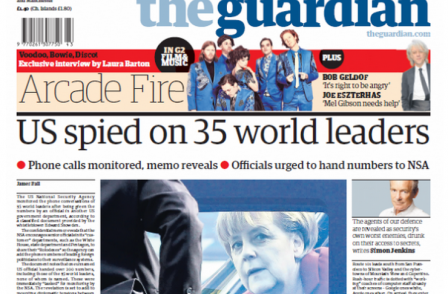
Revelations from The Guardian that the US may have eavesdropped on the telephone calls of 35 world leaders has prompted a concern from the French and German governments.
The US National Security Agency memo from 2006 is one of a cache of documents leaked to The Guardian by former contractor Edward Snowden.
The Guardian's publication of details about the extent of UK and US surveillance activities have prompted a huge public debate and led to allegations that the information could aid terrorists.
In August, Guardian editor Alan Rusbridger revealed that he had destroyed hard drives containing Snowden documents at the request of the UK Government. But he said the information had been sent overseas and the paper has continued to release information from the documents.
The latest memo reveals that a US Government official gave the NSA phone numbers of 35 world leaders and these had since been "tasked".
French president Francois Hollande said: "What is at stake is preserving our relations with the United States. They should not be changed because of what has happened. But trust has to be restored and reinforced."
German chancellor Angela Merkel spoke of her upset at the alleged phone monitoring, saying: "It's become clear that for the future, something must change – and significantly.
"We will put all efforts into forging a joint understanding by the end of the year for the co-operation of the (intelligence) agencies between Germany and the US and France and the US, to create a framework for the co-operation."
The White House said the US "is not monitoring and will not monitor" Mrs Merkel's communications – but officials in Berlin pointed out that it did not deny monitoring the phone in the past.
Caitlin Hayden, a spokesman for the National Security Council told the Daily Telegraph: "We do not monitor PM Cameron's communications."
Asked if the US had ever spied on Mr Cameron in the past, she replied: "No."
Kurt Volker, a former US ambassador to Nato 2008-2009, said "every country spies" and he could not believe that the revelations were a surprise to anyone.
He told the BBC Radio 4 Today programme: "I do want to give Chancellor Merkel and others a measure of credit and due credit, there is a measure of trust that matters. We are actually on the same side and we are talking to each other all the time so you don't expect those things are happening.
"But, at the same time, I do think this level of outrage is more for political reasons than for real outrage."
Lord West of Spithead, a security minister under Gordon Brown, said he had "always worked on the assumption" that people were listening to his phone calls.
"I know they jolly well were, " he told Today.
"I don't think it's surprising that people try and listen. If you are a head of state there are lots of people, not just other states, who are listening. There are companies, all sorts of people, who want to hear what you are saying and I think you have to be extremely careful."
He added: "What it has done is taken away attention from the real damage Snowden has done, which is actually listing names of good people who are now at risk and exposing techniques and ways of doing business by GCHQ and NSA that already people who wish to kill us are utilising to try and not get caught.
"He has, without doubt, made all of us less safe and that is a real worry."
Former Belgian prime minister Guy Verhofstadt told the programme: "The Americans spying on Iran, China and Korea, there are good reasons for, on Russia, but that they are doing it on France, on the chancellor of Germany… there is no reason for that. So I think it is a real scandal, a problem and we have to find a way out.
"There is a new agreement needed between the European countries and the US on this. It cannot continue like that."
Email pged@pressgazette.co.uk to point out mistakes, provide story tips or send in a letter for publication on our "Letters Page" blog
